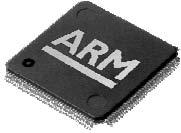IBM Teams Up With ARM for 14-nm Processing
IBM and ARM have extended their partnership to develop chips using 14-nm processing technology.
Monday IBM announced a partnership with UK chip developer ARM to develop 14-nm chip processing technology. The news confirms the continuation of an alliance between both parties that launched back in 2008 with an overall goal to refine SoC density, routability, manufacturability, power consumption and performance.
For the uninitiated, the idea is to build smaller, faster chip designs that provide better power management, resulting in longer battery life and better multimedia support than the current crop of ARM-based chips. With the help of ARM's design team, IBM will take ARM's intellectual property (IP) and cram it into IBM's miniscule manufacturing processes.
"ARM’s Cortex processors have become the leadership platform for the majority of smart phones and many other emerging mobile devices," said Michael Cadigan, general manager, IBM Microelectronics. "We plan to continue working closely with ARM and our foundry customers to speed the momentum of ARM technology by delivering highly advanced, low-power semiconductor technology for a variety of new communications and computing devices."
Through the previous ARM/IBM collaboration on the 32-nm and 28-nm, ARM has already delivered eleven test chips that provide concrete research structures and early silicon validation. However, using a 14-nm manufacturing process is quite a drop when compared to ARM's current crop of Cortex processors used in Nvidia's Tegra 2 and Samsung's Hummingbird chips, both of which are using 45-nm technology.
"IBM has a proven track record of delivering the core research and development that is relied upon by major semiconductor vendors worldwide for their advanced semiconductor devices. Their leadership of the ISDA alliance, which features a diverse set of top-tier companies as members, is growing in importance as consolidation trends in the semiconductor manufacturing industry continue," said Simon Segars, EVP and general manager, ARM physical IP division. "This agreement will ensure we are able to deliver highly tuned ARM Artisan Physical IP solutions on advanced ISDA process technologies to meet the early time-to-market our customers demand."
With the 32-nm and 28-nm samples currently out in the field for testing, it's uncertain when we'll see the first samples of the 14-nm process in action. Both ARM and IBM did not offer a projected "availability" date, so stay tuned.
Get Tom's Hardware's best news and in-depth reviews, straight to your inbox.

Kevin Parrish has over a decade of experience as a writer, editor, and product tester. His work focused on computer hardware, networking equipment, smartphones, tablets, gaming consoles, and other internet-connected devices. His work has appeared in Tom's Hardware, Tom's Guide, Maximum PC, Digital Trends, Android Authority, How-To Geek, Lifewire, and others.
-
accolite Wow 14nm that's crazy I thought the lowest they could go is 20nm then they wouldn't be able to control the flow of electrons!Reply -
joytech22 accoliteWow 14nm that's crazy I thought the lowest they could go is 20nm then they wouldn't be able to control the flow of electrons!Reply
I think that's for high-power devices, or IBM didn't hear about that lol.
It's so strange that we're getting so close to the absolute minimum our manufacturing technology can reach, I think within the next 5-10 years we'll be seeing chips with circuitry created at the atomic level, if it isn't already done that way right now. -
alchemy69 I remember reading an article in a technical journal about how pushing past 100nm would be impossible due to the laws of physics. That was only 15 years ago.Reply -
shoelessinsight accoliteWow 14nm that's crazy I thought the lowest they could go is 20nm then they wouldn't be able to control the flow of electrons!From what I understand, the limit is nearer to 3 nm, at which point quantum tunneling allows electrons to jump the barriers between circuits. At that point, I imagine our current technology path for computer design will reach a dead end.Reply
Of course, quantum tunneling isn't necessarily a barrier to our progress. Already, since decades ago, scientists and engineers have been putting forth ideas to use quantum tunneling to our advantage to build 3-dimensional processing units that would have even more performance potential than our current designs! -
nforce4max Another move by big blue. ARM has come a long way since the days of the BBC Micro and the Acorn computer.Reply -
NoCaDrummer ReplyBoth ARM and Intel did not offer a projected "availability" date, so stay tuned.
I thought this was ARM and IBM. -
shoelessinsight Alchemy69I remember reading an article in a technical journal about how pushing past 100nm would be impossible due to the laws of physics. That was only 15 years ago.I remember the same thing. Back when we were still measuring processing technology in micrometers, it seemed everyone was saying the limit was at 0.1 µm. I remember being very confused when we moved beyond that without hearing anything more about it.Reply
The limitations we'll be facing in the near future seem a bit more fundamental than whatever difficulties were being discussed 15 years ago, though. I don't imagine we'll be going much smaller for a long time once we reach that point. There are always other routes for progress, however. -
tsnorquist Atomic computing might be down the road, but I have a feeling someone will come up with a way of chemical computing just like nature does.Reply
